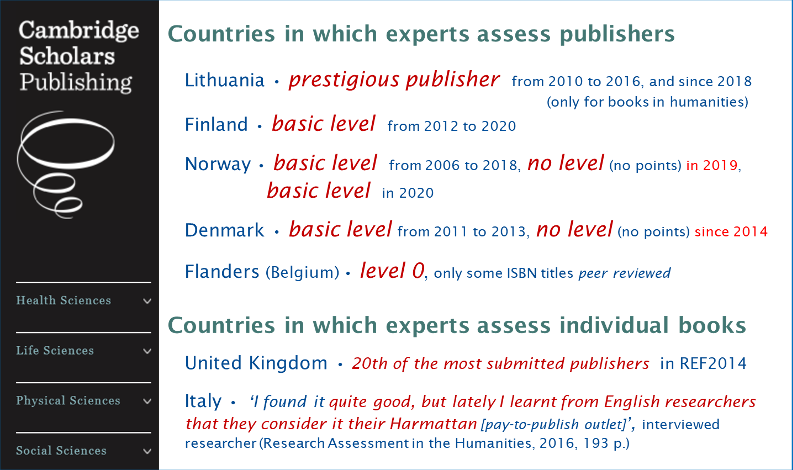Do not assess books by their publishers
In my PhD research, I investigate the practicalities of the evaluation of scholarly book outputs across countries. In this blog post, I discuss the inconsistencies I discovered in judgements about publishers. I also propose a model for future evaluation of scholarly books.
As my latest research reveals, the prestige of a book publisher yields points for getting government funding, not only in my home country Lithuania, but also in Denmark, Finland, Norway, and other countries. In these countries, institutions earn the maximum number of points for books issued by publishers ranked at the highest level, fewer points for books produced by publishers lingering at the entry level, and nothing when publishers do not qualify to enter the system.
In Lithuania, the decision whether a publisher is prestigious or not depends on the opinion of anonymous experts who assess physically submitted books. The prestige of a publisher is especially important for monographs in the sciences. Since only books published by prestigious (and only foreign) publishers earn a significant number of points (and funds), nothing is achieved if the experts decide that a publisher is not prestigious. It seems that nobody knows why some publishers were awarded the prestigious level in one year and designated as not prestigious in subsequent years, or the other way around.
Hunting for points, trickling down incentives, and gaming the system
As stated in the Norwegian Publication Indicator and elsewhere, the levels of publishers were created to incentivise researchers to publish their books in the most prestigious channels within their field of study.
People respond to incentives differently. Nonetheless, such rankings of publishers and institutional strategies to achieve more funds have led to hunting for points, trickling down incentives, and gaming the system. The more ambiguous the rules that are in place, the more prevalent gaming becomes.
My findings suggest that it is difficult to reach a common understanding of what it means to be a prestigious publisher.
Are publishers rated consistently across countries and over time?
Experts in different countries may have contradictory opinions on the prestige of a publisher. Figure 1 shows that the same publisher may be ranked as prestigious in Lithuania, as basic in Finland, and as not qualifying for points in Denmark and Norway. Consequently, depending on the country, books from the same publisher may yield the maximum, minimum, or zero points.
Even in a specific country, the level achieved by a publisher may fluctuate over time. As shown in Figure 1, Cambridge Scholars Publishing had the basic level between 2005 and 2018 in Norway; in the beginning of this period, it covered a quarter of all national book outputs in the social sciences and humanities. The publisher lost the basic level in 2019. There are no apparent reasons which explain this change in the Norwegian Registry. Interestingly, the publisher regained its prior status in 2020.

(data updated on 16 November 2020)
Cambridge Scholars Publishing is only one of the examples included in my recent paper, which examines not only the prestige of publishers but also the minimum requirements set for publishers.
As my findings suggest, there is no straightforward way to verify if a book publisher complies with the minimum mandatory prerequisites (displayed in the left part of Figure 2).
An alternative approach to book assessment
As seen from Figure 2, the current rankings of book publishers are focused mostly on publishers’ gatekeeping. The current national regulations usually do not set prerequisites on publishers’ contributions to the dissemination of academic research and scholarship.
My proposal is to start with the idea that there are several essential stages in scholarly book publishing: quality control, production, dissemination (along with archiving), and marketing of books. However, publishers do not contribute equally to each of these steps. But every stage is vital for the quality of book outputs from the perspectives of research evaluation and scholarly communication.

proposed for assessment of scholarly books.
My idea is that publishers may decide which services they want to offer in each step but that they need to be transparent by providing data on the services they have delivered. It would be best if publishers give the relevant information as metadata for every book they publish (e.g. along with the ISBN of the book). Ideally, the metadata would be easily accessible and freely available through channels suitable for academics, publishers, librarians, and other parties involved in book publishing and assessment.
I presented the above idea at Metrics 2020: Workshop on Informetric and Scientometric Research (SIG/MET). A recording is available here.
My initial findings indicate that there are various publishing services for book outputs. The same book could even be peer reviewed, issued, distributed, and translated by different independent publishers (or non-publishing companies). Importantly, there is a need to define and label these services in a consistent way.
Next steps
Many questions still need to be answered, such as: how can the different services provided by publishers best be classified? Can publishers produce machine-readable metadata? Where can the metadata be stored and accessed? How can metadata be gathered and processed?
I will further investigate these questions in my PhD research. And I hope that the academic community, publishers, librarians, and infrastructure providers will also contribute to realising my proposed model for book assessment.
My research paper Prestige of scholarly book publishers: an investigation into criteria, processes, and practices across countries is currently under peer review; nevertheless, it is accessible as a preprint.
I am grateful to my supervisor Ludo Waltman, who has helped to improve my work in innumerable ways, for his exceptional support. I am also thankful to Julie Martyn for her encouraging emails reaching me precisely at the time I got stuck in my writings.



0 Comments
Add a comment